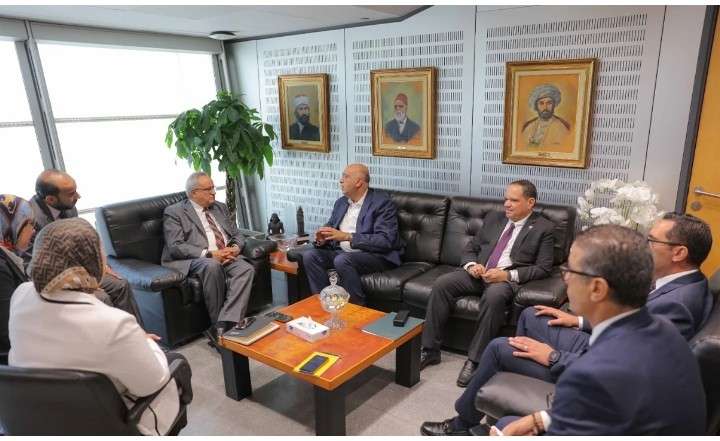Egypt’s Micro, Small and Medium Enterprises Development Agency (MSMEDA) has disbursed over EGP 2.2 billion (USD 45 million) in funding to Alexandria since July 2014, supporting more than 51,000 micro and small-scale projects and creating over 110,000 job opportunities.
The funding, which also covered EGP 102 million in infrastructure, training, and community development, is part of a national push to strengthen the role of MSMEs in the formal economy.
During a recent high-level meeting between Alexandria Governor Lieutenant General Ahmed Khaled and MSMEDA CEO Bassel Rahmy, as gathered by Techparley, officials discussed deepening cooperation to empower entrepreneurs, expand industrial zones, and ease access to services.
“We are not just funding businesses; we are building sustainable livelihoods and creating a new generation of Egyptian entrepreneurs,” said Rahmy during the session.
The initiative aligns with Prime Minister Mostafa Madbouly’s directive to foster economic inclusivity, especially for youth, women, and recent graduates.
Why This Matters
The ongoing push by the Egyptian government to support micro and small businesses is not just about job creation, it’s also about formalizing the informal economy.
By encouraging small enterprises to register officially and pay taxes, the state aims to bring thousands of unregulated businesses into the formal fold, thereby giving them access to legal protections, financial services, and growth opportunities.
In this context, Law 6 of 2025 plays a pivotal role. The law introduces a simplified tax system tailored to small business realities.
Enterprises with annual revenues of EGP 500,000 will now pay only 0.4% in taxes, while those earning between EGP 10 and 20 million will be taxed at 1.5%.
Moreover, several other levies, including stamp duties and miscellaneous fees that previously hindered small business registration, have been eliminated.
“This reform sends a clear message,” said a senior official from the Ministry of Finance, “that we are not only demanding tax compliance, but also offering fair and realistic incentives for businesses to grow legally.”
Symbolizing the government’s hands-on support, the recent meeting in Alexandria concluded with the distribution of loan checks and business licenses to ten entrepreneurs.
It was both a practical gesture and a strong signal that the state’s promises are backed by real, tangible action.
Driving Youth and Women Empowerment Through Enterprise Support
At the heart of MSMEDA’s agenda is a deliberate strategy to empower Egypt’s growing population of unemployed youth and underrepresented women.
“Our goal is to transform potential into productivity,” said Bassel Rahmy.
Noting that many of the supported businesses are led by first-time entrepreneurs under the age of 35. MSMEDA also runs targeted training programs and advisory services to help women-led enterprises navigate financial and regulatory landscapes.
With unemployment among Egyptian youth reaching 24.3% in 2023 (World Bank), the agency’s efforts are crucial for bridging economic gaps and fostering social mobility.
Industrial Zones as Growth Hubs: Spotlight on Borg El Arab and El-Merghem
The industrial zones of Borg El Arab and El-Merghem are central to MSMEDA’s expansion plan in Alexandria.
These zones are being repositioned as entrepreneurship hubs through easier licensing, infrastructure upgrades, and proximity to logistics networks.
According to Alexandria’s governor,
“We’re creating an ecosystem that invites manufacturing, innovation, and exports.”
Investments in these zones are expected to improve local supply chains and attract more investment from both public and private stakeholders, thereby turning small workshops into formal enterprises with sustainable growth models.
Law 6 of 2025: How New Tax Breaks Will Ease Business Burden
The enactment of Law 6 of 2025 introduces major tax reforms tailored to support MSMEs and incentivize informal businesses to register formally.
Under the new structure, enterprises with annual revenues of EGP 500,000 will pay a modest 0.4% tax rate, while those generating between EGP 10–20 million will be taxed at 1.5%.
The law also includes exemptions from certain stamp duties and other previously burdensome fees.
“This law is a turning point,” said a Finance Ministry official. “It sends a strong message that the state supports legal entrepreneurship, not bureaucracy.”
Financing and Infrastructure: Where EGP 2.2 Billion Was Spent
While the bulk of MSMEDA’s EGP 2.2 billion funding in Alexandria was allocated as direct loans to small entrepreneurs, a significant portion, EGP 102 million, was used for infrastructure development and training.
These projects include the rehabilitation of local markets, road access to production sites, and vocational training centers for aspiring business owners.
The agency has also distributed startup capital during community events, such as handing out loan checks and business licenses to 10 entrepreneurs at the recent governorate meeting.
Such hands-on outreach signals a practical and sustained approach to grassroots economic development.
Talking Points
Egypt’s strategic investment of over USD 45 million through its Micro, Small and Medium Enterprises Development Agency (MSMEDA) marks a significant shift in how African governments can effectively empower small businesses.
The initiative demonstrates a structured and inclusive approach, combining financing, infrastructure development, skills training, and simplified strategies under the new law.
This law introduces progressive, low tax rates and eliminates several burdensome fees, encouraging informal businesses to register formally and access state support.
It reflects a broader effort by the Egyptian government to drive local economic development while promoting formalization and entrepreneurship, especially among youth, women, and recent graduates.
Compared to countries like Nigeria, where MSME support remains fragmented, underfunded, and often trapped in bureaucracy, Egypt offers a replicable model.
Nigeria’s small businesses suffer from inconsistent policies and limited access to finance, making formalization unattractive.
Egypt’s integrated and transparent approach, anchored by a dedicated agency with legal authority, shows how well-coordinated government support can turn MSMEs into engines of job creation and economic resilience.
For Nigeria and other African economies, this is not just an example to admire but a practical blueprint for inclusive, bottom-up growth.





